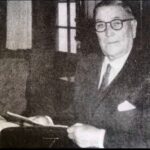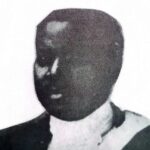YUSUFU, BOMBO LAHAI
- 4 Min Read
Bombo Lahai Yusufu (18?-circa 1940) was the paramount chief of Tonko Limba, in Kambia district, Northern Province in Sierra Leone. He was deposed by the colonial government for suspected complicity in an anti-British uprising led by Haidara Kontorfili. It is still unclear to what extent he was involved.
He was the son of a Limba man, Dauda, and a Fula woman from Timbo, and was descended from the KaBubuya ruling house. He became the paramount chief of Tonko Limba in 1922.
In the years immediately following World War I his chiefdom faced serious economic problems, one of which was low agricultural output. People were forced to pay regular taxes. A plague of locusts continued unabated despite measures taken by the administration to check it. As these proved ineffective, by 1930 the problem had become very acute.
At this time news was received that a powerful Muslim with medicine to check the plague was living in a neighbouring chiefdom. This is one of the reasons usually advanced by Tonko Limba people to explain the arrival of Haidara Kontofili, a radical religious leader, in Bombo Lahai Yusufu’s chiefdom.
As all traditional rulers would do, Bombo Lahai Yusufu extended a friendly welcome to this important stranger, believing that Haidara’s knowledge would be put to the service of his people and save them from further economic hardship. Haidara called upon the people of KaBubuya, and later the entire chiefdom, to offer prayers regularly, and preached a general message urging the return to a life of virtue.
As his following grew Haidara ordered all the local medicine men to destroy their ‘swears,’ charms and amulets. Many of these traditional healers and diviners, however, refused to carry out what amounted to a death sentence against their profession. The elusive Nodi, a famous medicine man, who dishonoured many promises to destroy his swears, was a typical example of the resistance of this group of specialists.
Apparently, Yusufu himself did not give wholehearted support to this aspect of Haidara’s activities, since as paramount chief he had to take part in many religious functions in which these medicine men featured prominently.
As news of Haidara’s activities spread, the colonial administration called on Yusufu to expel him from his chiefdom. Lacking any organised military force, the chief was powerless in the face of Haidara’s growing popularity. It was only when Haidara had denounced the colonial government and called upon the people to refuse to pay any more taxes that the colonial officials realised the gravity of the situation in Yusufu’s chiefdom. Haidara was killed in a confrontation with troops sent by the administration to arrest him in March 1931.
In the wake of the Haidara affair, Yusufu was accused of complicity in an anti-British uprising. To prove his innocence the chief swore that he would ‘eat bread,’ a piece of rice flour mixed with ‘medicines’ eaten when a serious oath is administered, a ceremony no Limba treats lightly. Convinced of the chief’s guilt, the administration deposed him in 1931, making him the only important Tonko Limba chief to have been so humiliated under British rule.
Some authors, on scanty evidence, have labelled Yusufu a bad chief, but many reject this view, and members of the KaBubuya house have defended their chief. They hold that Yusufu’s deposition was an unwarranted interruption of KaBubuya rule, pointing out that in the traditional political context, Tonko paramount chiefs held office for life, except when found guilty of atrocious crimes against their subjects.
The Kamara clan, for example, lost its rights to nominate successors to a vacant chiefship because its members were slave dealers who sold their people without compunction.
Yusufu retired into private life after he was de-stooled, and died about nine years later.
AMADU TURAY




